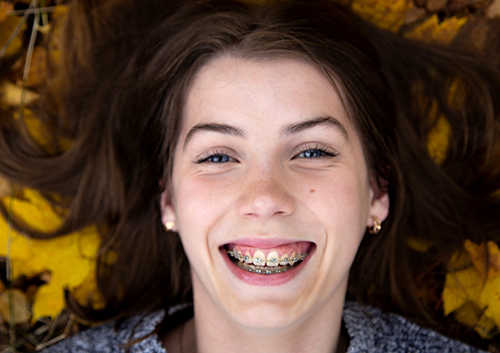
Plaque is a sticky subject! It sticks to the enamel of our teeth above and below the gum line, and it collects around braces. Plaque is one of the major causes of tooth decay and gum disease, and our teeth are under daily attack by this filmy menace.
What are the facts about plaque, and how can we fight back? Read on for some effective strategies!
What Is Plaque?
Plaque is a sticky film that builds up on our teeth, largely made up of millions of different types of oral bacteria. Plaque is a colorless biofilm at first, but as it collects, it takes on a white or yellow tint. If you haven’t brushed for a few days, that fuzziness you feel on your teeth is plaque build-up. Unless it’s removed, plaque hardens within a matter of days to become tartar.
- Tip: You can remove plaque with careful brushing and flossing, but it takes a dental professional to remove tartar. Be proactive!
Why Does Plaque Cause Cavities?
Bacteria in plaque use our food as their food, especially sugars and carbs. They can then transform these nutrients into acids, which attack our tooth enamel, weakening it and leaving it vulnerable to further erosion and eventual decay.
- Tip: Cavities aren’t the only damage caused by accumulated plaque. Plaque also collects along and below the gum line. If tartar forms here, it irritates delicate gum tissue, leading to gingivitis and more serious gum disease. Make sure you don’t forget your gums when you brush and floss.
When Does Plaque Build Up?
The short answer? Plaque is always forming, because oral bacteria are a natural part of our biology. (In fact, there are even oral bacterial which are beneficial.) Plaque starts building up within minutes after eating, and during the night as we sleep.
That’s why we recommend brushing for two minutes at least twice a day, and flossing at least once a day. When you wear braces or aligners, brushing more often is a good idea. Food collecting around braces or inside aligners is a feast for plaque! Ask Dr. Iwei Huang for suggestions for your best brushing schedule.
- Tip: Just because plaque is unavoidable, that doesn’t mean we need to give the bacteria in plaque any additional encouragement. Every time you have a meal or a snack that’s heavy in carbs and sugars, you are providing more fuel for acid production. Cutting down on foods like sugary desserts and sodas is not only nutrition-healthy, it’s tooth-healthy!
Where Does Plaque Collect?
Plaque builds up all over tooth surfaces, at the gum line, and even below the gum line. It’s especially easy to miss in hard-to-reach places like the irregular surfaces of molars, between the teeth, behind our front teeth, and near the gum line. Plaque also collects around your braces, and requires special care to make sure your teeth don’t suffer cavities or the white spots caused by demineralization.
- Tip: One of the ways plaque avoids detection is its invisibility. Fortunately, if you’re having trouble brushing away all your plaque, there are plaque-disclosing toothpastes and chewable tablets available in the dental aisle which reveal the plaque hiding between, behind, or around your teeth by tinting it with a can’t-miss color. Just brush the color away, and you’ve brushed the plaque away as well.
How Do We Clean Away Plaque?
Use the Right Tools
Floss at least once a day. There are different materials, sizes, and coatings for floss, so you can find one that’s comfortable for you. Floss reaches those spots in between teeth and around the gum line that brushes miss.
Choose a soft toothbrush (soft bristles are better for your enamel) and change it every three to four months, or as soon as the bristles show wear. Make sure the head is the right size—too big, and it’s not only uncomfortable, but you won’t be able to reach all the surfaces you need to.
- Tips: There are special dental flosses created just for your braces. You can also use interproximal brushes water flosser to clean around wires and brackets. If you have trouble removing plaque around your teeth and braces with a manual toothbrush, consider an electric model. Several studies have shown a reduction in plaque with the use of an electric brush.
Use the Right Toothpaste
There are many toothpastes specifically formulated to fight plaque and tartar. And fluoride toothpastes not only fight cavities, they can strengthen your enamel.
- Tip: Studies have shown that toothpastes with baking soda, in particular, are effective in reducing plaque. Ask Dr. Iwei Huang for a recommendation the next time you’re at our Chicago office.
Use the Right Technique
What not to do? A forceful, horizontal sawing motion is awkward, hard on your enamel, and misses plaque and debris between the teeth. Technique is important—not for style points, but for cleaner teeth!
Hold your toothbrush at a 45-degree angle, especially at the gum line, to gently remove plaque from teeth and gums. Use short strokes or a circular motion to clean as much of the surface and between the teeth as possible. Brush the inside of your front teeth with careful vertical strokes—remember, that’s one place where plaque is easy to overlook. The same holds true for the tops of your molars, so thoroughly clean those uneven surfaces.
If you wear braces, be sure to clean thoroughly around brackets and wires, where plaque can accumulate quickly.
- Tip: If you wear clear aligners, don’t forget to give them a gentle brushing as well! Plaque can stick to aligners, causing discoloration and odors, so follow our cleaning instructions carefully.
Who Can Help You Fight Plaque?
Even when you do your best at home, plaque can still be a sticky problem. That’s why we advise regular professional cleanings, which not only remove any plaque that’s hiding away, but also eliminate any built-up tartar around your braces. And, of course, there you can learn all about how to keep your teeth their cleanest.
True, you’re fighting plaque every day, but you have all the tools you need to make sure your teeth and gums stay healthy. You’re winning the battle with plaque every time you eat a nutritious meal, and every time you brush and floss. With that kind of strategy, plaque doesn’t stand a chance. And your bright smile and healthy teeth and gums? That’s a victory worth celebrating!




